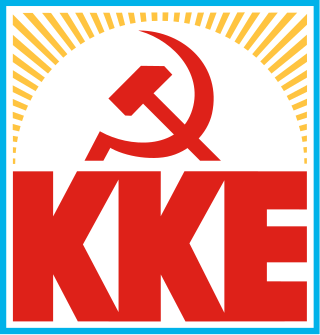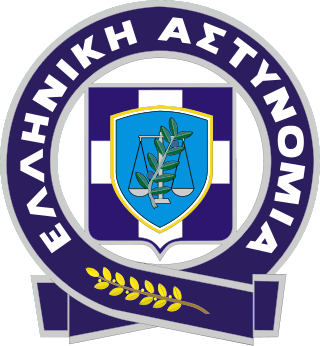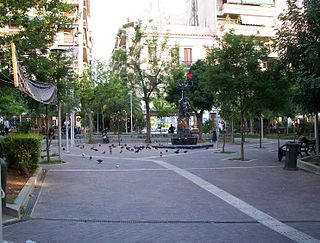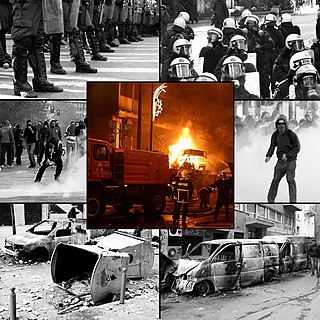Related Research Articles

The Communist Party of Greece is a Marxist–Leninist political party in Greece. It was founded in 1918 as the Socialist Workers' Party of Greece (SEKE) and adopted its current name in November 1924. It is the oldest political party in modern Greek politics. The party remains active and members hold various government positions.

Villa Amalia is the name of the building that hosted the former Second High School of Athens in Greece. It is located on the corner of Acharnon and Heiden streets, near Victoria metro station. It was an anarchist squat before its eviction in 2012. It reopened as a school in 2016.
Human rights in Greece are observed by various organizations. The country is a signatory to the European Convention on Human Rights, the Geneva Convention relating to the Status of Refugees and the United Nations Convention Against Torture. The Greek constitution also guarantees fundamental human rights to all Greek citizens.
Anarchism in Greece traces its roots to ancient Greece but was formed as a political movement during the 19th century. It was in the ancient era that the first libertarian thoughts appeared when philosophers based on rationality questioned the fundamentals of tradition. Modern anarchism in Greece emerged in the 19th century, heavily influenced by the contemporary European classical anarchism. Because of the Bolshevik success in the Russian Revolution of 1917 and the rise of the Communist Party, anarchism faded after the first decades of the 20th century. The collapse of the military junta put an end to the monopoly of the political power from the Right, whereas the dissolution of the Soviet Union diminished the allure of the Communist Party of Greece allowing anarchist groups to gain pace in Athens and other cities.

The Democratic Army of Greece was the army founded by the Communist Party of Greece during the Greek Civil War (1946–1949). At its height, it had a strength of around 50,000 men and women. The DSE was backed up by the Popular Civil Guard, the Communist Party's security police force.

The Hellenic Police is the national police service and one of the three security forces of Greece. It is a large agency with responsibilities ranging from road traffic control to counter-terrorism. Police Lieutenant General Dimitrios Mallios is Chief of the Hellenic Police. He replaced Lazaros Mavropoulos. The Hellenic Police force was established in 1984 under Law 1481/1-10-1984 as the result of the fusion of the Gendarmerie and the Cities Police forces.

Exarcheia is a community in central Athens, Greece close to the historical building of the National Technical University of Athens. Exarcheia took its name from a 19th-century businessman named Exarchos who opened a large general store there. Exarcheia is bordered on the east by Kolonaki and is framed by Patission Street, Panepistimiou Street and Alexandras Avenue. Exarcheia is known for being Athens' historical core of radical political and intellectual activism. Exarcheia is often considered the anarchist quarter of Athens, known for its radical democracy.

The Dekemvriana refers to a series of clashes fought during World War II in Athens from 3 December 1944 to 11 January 1945. The conflict was the culmination of months of tension between the left-wing EAM, some parts of its military arm, the ELAS, stationed in Athens, the KKE and the OPLA from one side and from the other side, the Greek Government, some parts of the Hellenic Royal Army, the Hellenic Gendarmerie, the Cities Police, the Organization X, among others and also the British Army.

The 2008 Greek rebellion started on 6 December 2008, when Alexandros Grigoropoulos, a 15-year-old Greek student, was killed by a special officer in Exarcheia district of central Athens. The killing of the young student by police resulted in large protests and demonstrations, which escalated to widespread rioting, with numerous rioters damaging property and engaging riot police with Molotov cocktails, stones and other objects. Demonstrations and rioting soon spread to several other cities, including Thessaloniki, the country's second-largest city, and international cities in solidarity. Newspaper Kathimerini called the rioting "the worst Greece has seen since the restoration of democracy in 1974".

The Athens Polytechnic uprising occurred in November 1973 as a massive student demonstration of popular rejection of the Greek military junta of 1967–1974. It began on 14 November 1973, escalated to an open anti-junta revolt, and ended in bloodshed in the early morning of 17 November after a series of events starting with a tank crashing through the gates of the Athens Polytechnic.
The Units for the Reinstatement of Order are a special division of the Hellenic Police, whose primary and most infamous role is that of riot control.
Greek Unity is a minor Greek nationalist political party.

The anti-austerity movement in Greece involved a series of demonstrations and general strikes that took place across the country. The events, which began on 5 May 2010, were provoked by plans to cut public spending and raise taxes as austerity measures in exchange for a €110 billion bail-out, aimed at solving the Greek government-debt crisis. Three people were killed on 5 May in one of the largest demonstrations in Greece since 1973.
Socialism in Greece has a significant history, with various activists, politicians and political parties identifying as socialist. Socialist movements in Greece began to form around the early 20th century, including the Communist Party of Greece (KKE) (1920–present), the Socialist Party of Greece (1920-1953) and the Panhellenic Socialist Movement (PASOK). Socialist ideology is present in ΚΚΕ also known as the Communist party of Greece.
Events in the year 2021 in Greece.
The 2021 Greek protests broke out in response to a proposed government bill that would allow police presence on university campuses for the first time in decades, for which opposition groups accused the government of taking advantage of the COVID-19 lockdown to impose increasingly authoritarian measures. Protests intensified in response to the hunger strike of the prisoner Dimitris Koufontinas, a former member of terrorist organization 17N, who had started the strike in December, demanding his transfer to a different prison after he had been forcibly relocated to a maximum-security facility in central Greece, as well as issues relating to police brutality and specifically the DELTA Force motorcycle police.
Nikos Temponeras was a high school mathematics teacher, and a member of the left-wing Labour Anti-imperialistic Front (EAM). Temponeras was murdered in Patras during the student protests of 1990–1991 by Giannis Kalampokas, a municipal councillor and president of the local New Democracy branch.
The 1990–1991 student protests in Greece were carried out against an education-related bill proposed by the New Democracy-led Greek government. The protests were accompanied by school occupations, and the students were subjected to violent attacks from the Hellenic Police and organizations aligned with New Democracy. Five people were killed during the demonstrations; mathematics teacher and left-wing activist Nikos Temponeras was assassinated during an attack by members of the Youth Organisation of New Democracy (ONNED) in Patras in January 1991, and, two days later, another four people died in a fire caused by a tear gas agent fired by the police in Athens.
Shehzad Luqman was a 27-year-old man of Pakistani origin who was murdered by members of Golden Dawn in the early hours of 17 January 2013 in Petralona, Athens.
The Special Violent Crime Squad, also officially known as Directorate for Combating Special Violent Crimes, is a special service of the Hellenic Police, working in conjunction with regional and other police sectors where necessary. It reports directly to the Chief of Hellenic police and has territorial juristriction nationwide.
References
- 1 2 Epochi, rizospastis gr | Synchroni (2000-11-16). "rizospastis.gr - ΑΛΛΑ ΣΗΜΑΝΤΙΚΑ ΓΕΓΟΝΟΤΑ ΣΤΙΣ 16 ΤΟΥ ΝΟΕΜΒΡΗ". ΡΙΖΟΣΠΑΣΤΗΣ. Retrieved 2022-10-06.
- 1 2 tvxs.gr (2021-11-16). "Ι.Κουμής - Σ.Κανελλοπούλου: Οι ξεχασμένοι νεκροί της αστυνομικής βίας". TVXS - TV Χωρίς Σύνορα (in Greek). Retrieved 2022-10-06.
- 1 2 "Αφιέρωμα στη Σταματίνα Κανελλοπούλου και τον Ιάκωβο Κουμή, θύματα των ΜΑΤ | LiFO". www.lifo.gr (in Greek). 2015-11-17. Retrieved 2022-10-06.
- ↑ "Κανείς δεν ξεχνά τα θύματα της αστυνομικής βίας". Η Εφημερίδα των Συντακτών (in Greek). Retrieved 2022-10-06.